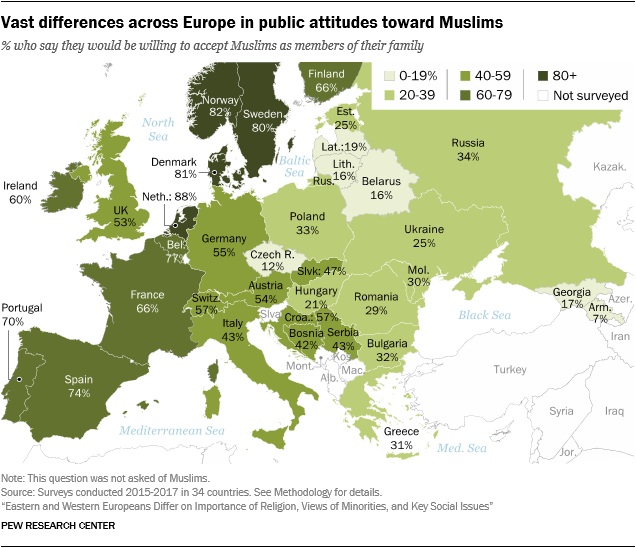People in Central and Eastern Europe are less accepting of Muslims – Study suggests

The definition and boundaries of Central, Eastern and Western Europe can be debated. No matter where the lines are drawn, however, there are strong geographic patterns in how people view religion, national identity, minorities and key social issues. Particularly sharp differences emerge when comparing attitudes in countries historically associated with Eastern vs. Western Europe.
As Pew Research has found, Eastern and Western Europeans differ on importance of religion, views of minorities, and key social issues. For example the picture above reflects vast differences across the European continent in public attitudes towards Muslims. Among several others, the question asked was: Would you be willing to accept Muslims as members of your family?
The Iron Curtain that once divided Europe may be long gone, but the continent today is split by stark differences in public attitudes toward religion, minorities and social issues such as gay marriage and legal abortion. Compared with Western Europeans, fewer Central and Eastern Europeans would welcome Muslims into their families or neighborhoods, extend the right of marriage to gay or lesbian couples or broaden the definition of national identity to include people born outside their country.
These differences (also in the lead-picture above) emerge from a series of surveys conducted by Pew Research Center between 2015 and 2017 among nearly 56,000 adults (ages 18 and older) in 34 Western, Central and Eastern European countries, and they continue to divide the continent more than a decade after the European Union began to expand well beyond its Western European roots to include, among others, the Central European countries of Poland and Hungary, and the Baltic states of Estonia, Latvia and Lithuania.
The continental divide in attitudes and values can be extreme in some cases. For example, in nearly every Central and Eastern European country polled, fewer than half of adults say they would be willing to accept Muslims into their family; in nearly every Western European country surveyed, more than half say they would accept a Muslim into their family.
In a separate question, Western Europeans also are much more likely than their Central and Eastern European counterparts to say they would accept Muslims in their neighborhoods. For example, 83% of Finns say they would be willing to accept Muslims as neighbors, compared with 55% of Ukrainians. And although the divide is less stark, Western Europeans are more likely to express acceptance toward Jews in their neighborhoods as well.
The definition and boundaries of Central, Eastern and Western Europe can be debated. No matter where the lines are drawn, however, there are strong geographic patterns in how people view religion, national identity, minorities and key social issues.
However, not every country in Europe neatly falls into this pattern. For example, in the Baltic states of Latvia and Estonia, the vast majority of people say being Christian (specifically Lutheran) is not important to their national identity. Still, relatively few express willingness to accept Muslims as family members or neighbors.
Source: pewforum.org



